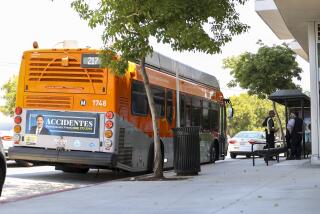Plan for 22 Gets Funds
- Share via
The state plans to immediately restore $44 million in funding for the long-awaited expansion of the Garden Grove Freeway, Assemblyman Lou Correa (D-Anaheim) announced Thursday.
Correa said that after several discussions with Gov. Arnold Schwarzenegger and high-ranking transportation officials, Orange County legislators managed to keep that amount in the state budget for the highway project.
“Everything looks fine,” Correa said. “These funds will help improve the traffic flow on the Garden Grove Freeway, create good-paying jobs and improve the quality of life for many residents.”
The overall plan calls for $383 million in improvements to 12 miles of freeway from the San Diego Freeway to Main Street in Orange. The work includes right-of-way acquisitions, widenings, carpool lanes, and on- and offramps.
No major improvements have been made to the freeway since it opened in the mid-1960s.
Because of the state budget shortfall, the project lost about $167 million in funds last year that the Orange County Transportation Authority had counted on to pay for almost half the project.
“On behalf of 350,000 commuters who are stuck in gridlock every day, we are pleased to have these funds available so we can finally move forward,” said OCTA board Chairman Gregory Winterbottom.
OCTA is negotiating final bids from two major contractors. If the issues are resolved in the weeks ahead, authority officials say, construction could begin this fall. The work might be completed as early as 2007.
Correa said the money was coming from the restoration of $140 billion in revenue to the state’s Traffic Congestion Relief Fund, which was gutted to help ease the state’s budget crunch.
State finance officials said $44 million was earmarked for the Garden Grove Freeway. The project, they said, could receive $123 million more, depending on the outcome of two Indian gambling measures on the November ballot.
One would require tribes that own casinos to contribute 25% of their slot machine revenue to state and local governments. If they refused, card rooms and horseracing tracks would gain the right to install 30,000 slot machines and would pay roughly $1 billion per year from the profits, primarily to local governments.
The other measure would grant tribes unlimited casino-expansion rights on their land. In return, tribes would pay the state 8.84% of their net profit for 99 years.
Schwarzenegger has vowed to campaign against both propositions. He recently renegotiated compacts with five tribes, increasing their payments to the state by $1 billion this fiscal year and $150 million to $200 million each year until 2030. In return, the tribes will be allowed to increase the number of slot machines in their casinos and retain the exclusive right to slot machine gambling in California.
More to Read
Sign up for Essential California
The most important California stories and recommendations in your inbox every morning.
You may occasionally receive promotional content from the Los Angeles Times.














